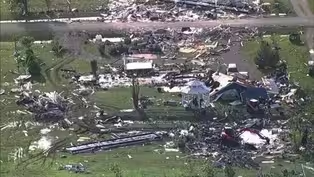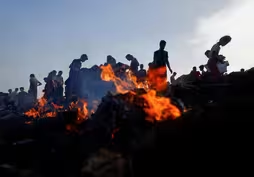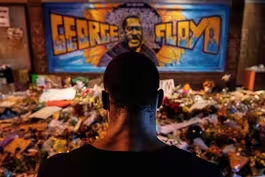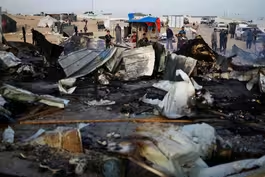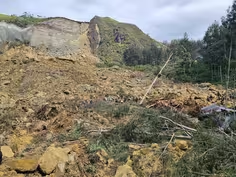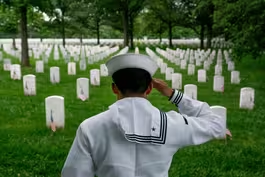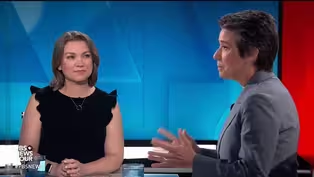
The class of 2024 reflects on their unique school experience
Clip: 5/27/2024 | 5m 14sVideo has Closed Captions
The class of 2024 reflects on their unique school experience
With graduation season in full swing, the class of 2024 is reflecting on a highly unusual four years of school. Their freshman experience was marked by pandemic lockdowns, but that was just the first in a chain of momentous global events. We spoke to some members of this class about how they're looking back and forward.
Problems playing video? | Closed Captioning Feedback
Problems playing video? | Closed Captioning Feedback
Major corporate funding for the PBS News Hour is provided by BDO, BNSF, Consumer Cellular, American Cruise Lines, and Raymond James. Funding for the PBS NewsHour Weekend is provided by...

The class of 2024 reflects on their unique school experience
Clip: 5/27/2024 | 5m 14sVideo has Closed Captions
With graduation season in full swing, the class of 2024 is reflecting on a highly unusual four years of school. Their freshman experience was marked by pandemic lockdowns, but that was just the first in a chain of momentous global events. We spoke to some members of this class about how they're looking back and forward.
Problems playing video? | Closed Captioning Feedback
How to Watch PBS News Hour
PBS News Hour is available to stream on pbs.org and the free PBS App, available on iPhone, Apple TV, Android TV, Android smartphones, Amazon Fire TV, Amazon Fire Tablet, Roku, Samsung Smart TV, and Vizio.
Providing Support for PBS.org
Learn Moreabout PBS online sponsorshipGEOFF BENNETT: With graduation season in full swing, the class of 2024 is reflecting on a highly unusual four years of school.
Their freshman experience was marked by pandemic lockdowns, but that was just the first in the chain of momentous global events.
We spoke to some members of this class about how they're looking back and forward.
REESA VENTEREA, Student: My name is Reesa Venterea, and I am a senior in high school in Minneapolis, Minnesota.
AIDAN BOOKER, Student: My name is Aidan Booker.
I'm a graduating senior from Twinsburg, Ohio.
NICOLLETTE GABRIEL, Student: I'm Nicollette Gabriel.
And I just graduated from Buffalo Performing Arts.
And I live in Buffalo, New York.
MATTHEW SPIKER, Student: My name is Matthew Spiker.
I'm 22 years old and I just graduated from Georgia Tech with a degree in electrical engineering.
ENOLA GUETA, Student: My name is Enola Gueta.
I'm a graduating senior at the University of California, Davis.
REESA VENTEREA: Our class has definitely experience a lot of turbulence and uncertainty.
AIDAN BOOKER: I think everyone that lived during this period shares a sort of unique bond that's just never been seen before.
NICOLLETTE GABRIEL: I think it's really crazy to see everything that has happened.
It's just like, is -- am I living a dream?
Like, this can't be real.
MATTHEW SPIKER: I think the past four years can basically be described as living out a history book, right.
COVID pandemic, protests, the Russia-Ukraine war, or what's happening in the Middle East, right, is basically living out everything that you would see in a history book, right?
It's unsettling to me.
ENOLA GUETA: I think about that contrast a lot of, like, the March, it's only going to be two weeks and I'm going to come back, to the December gloom of, when is this going to end?
You can't just go back to normal after that.
There was no back to normality or back to a before time.
AIDAN BOOKER: Our entire freshman year was online.
And then sophomore year, it was still online, and then the entire high school year, you're sort of transitioning and getting back into the groove of talking to people and just adjusting to that face-to-face connection.
So we definitely had it the worst, I would say.
REESA VENTEREA: So I am about 11 minutes away from where George Floyd was murdered in May of 2020.
I remember the days after that my history teacher completely gotten rid of whatever content, curriculum, modules, activities that she had planned for us.
She was honestly like, disregard this.
We don't need to talk about this stuff.
History is happening right now.
And we dedicated those next three days in class to just talking and feeling and being angry, being sad, crying.
Those few weeks in May, everything that happened within June, July and August, that had completely shaped what I wanted to do for the rest of my life and supplemented my academic curiosity in the field of civil rights.
ENOLA GUETA: It's so easy for people of my generation to be pessimistic.
We have all of the reason, in my opinion, to be pessimistic about our future.
But there is people actively working not to be, and I think that's something to really celebrate personally, restlessness at what good -- what the future can hold for us, even if it seems like there are odds stacked against us.
MATTHEW SPIKER: Living through COVID as it emerged in real time before us basically threw me out into the real world without any preparation, right?
Here's the real world now, 50,000 people are dying a week of this disease, and you and the rest of society has to figure this out now.
Good luck.
NICOLLETTE GABRIEL: I would explain it as being chaotic, hectic and scary, but also being able to notice things more and being able to have a better understanding of things and still find the happiness in the very small things that we do or were able to enjoy.
AIDAN BOOKER: Hard times make strong people, so I think we're not grateful it happened, but looking back, in retrospect, I think it really taught us a lot about ourselves as people.
We sort of got to, like, in a way, focus on ourselves and what we want to do in the future.
REESA VENTEREA: Without the past four years, without everything that has happened in our nation, I don't feel I would have been fully equipped to take on the world if a lot of these things didn't happen at such a young age for me and my fellow classmates.
The human that I am today would not -- I think would not be as optimistic as she is, because I feel I have seen the bad.
We have experienced the bad, we have been in the bad, and to know that there is a lot of hope for, how bad a situation can get, it'll always turn around.
Amid tornado wave, experts expect active hurricane season
Video has Closed Captions
Clip: 5/27/2024 | 6m 41s | Amid a wave of deadly tornadoes, experts also expect an active hurricane season (6m 41s)
Experts weigh in as Netanyahu calls Rafah strike a mistake
Video has Closed Captions
Clip: 5/27/2024 | 8m 25s | Netanyahu says Rafah camp strike was a ‘tragic mistake.’ Experts weigh in on what happened (8m 25s)
How policing has changed 4 years after George Floyd's murder
Video has Closed Captions
Clip: 5/27/2024 | 6m 56s | How policing has changed 4 years after George Floyd's murder (6m 56s)
Israeli airstrike on Rafah tent camp kills 45 Palestinians
Video has Closed Captions
Clip: 5/27/2024 | 3m 8s | Israeli airstrike on Rafah tent camp kills 45, triggers new wave of condemnation (3m 8s)
News Wrap: 2,000 killed in Papua New Guinea landslide
Video has Closed Captions
Clip: 5/27/2024 | 4m 51s | News Wrap: At least 2,000 killed in Papua New Guinea landslide (4m 51s)
New technology helping identify remains of service members
Video has Closed Captions
Clip: 5/27/2024 | 7m 34s | New technology helping identify remains of fallen U.S. service members (7m 34s)
Tamara Keith and Amy Walter on the state of the campaign
Video has Closed Captions
Clip: 5/27/2024 | 8m 48s | Tamara Keith and Amy Walter on the state of the presidential race heading into the summer (8m 48s)
Providing Support for PBS.org
Learn Moreabout PBS online sponsorship
- News and Public Affairs

FRONTLINE is investigative journalism that questions, explains and changes our world.

- News and Public Affairs

Amanpour and Company features conversations with leaders and decision makers.












Support for PBS provided by:
Major corporate funding for the PBS News Hour is provided by BDO, BNSF, Consumer Cellular, American Cruise Lines, and Raymond James. Funding for the PBS NewsHour Weekend is provided by...

